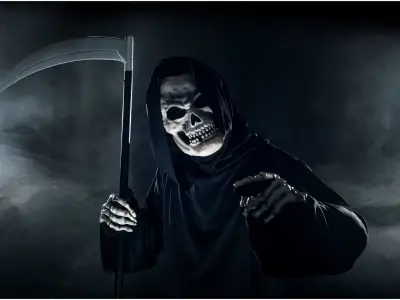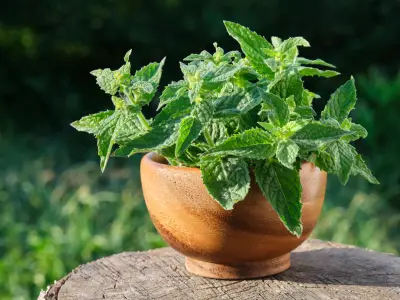Throughout history, few figures from mythology have evoked as much fascination as the Valkyries—mysterious warrior maidens who shaped the fate of gods and men. These legendary beings from Norse mythology were far more than symbols of battle; they embodied destiny, honour, and the delicate balance between life and death, leaving a lasting imprint on folklore and modern culture.
Whether you're fascinated by Norse legends, curious about the Valkyrie meaning, or wondering how these mystical figures continue to influence modern culture, understanding the Valkyries in Norse mythology opens a window into a world where gods, mortals, and destiny collide.
Let’s explore who these iconic figures truly were, the myths surrounding them, their powers, and the Valkyrie symbolism that endures to this day.
Jump to:
- Who Were Valkyries in Norse Mythology?
- Valkyries’ Myths
- The Role of Valkyries in Norse Storytelling
- What Powers Did the Valkyries Possess?
- Symbols Associated with Valkyries
- Valkyries’ Lineage and Connections
- Why Are Valkyries Special?
- Valkyries in Modern Culture
- Valkyries’ Worship and Legacy
- Frequently Asked Questions About Valkyries
- Study Norse Mythology for £29
Recommended for you!
Best SellersWho Were Valkyries in Norse Mythology?
In Norse mythology, Valkyries were powerful female spirits who served Odin, the Allfather and chief of the gods. The Valkyrie definition comes from Old Norse "valkyrja," meaning "chooser of the slain." Their primary role was to select brave warriors who died in battle and guide their souls to Valhalla, Odin’s great hall.
Valkyries were distinct in their warrior-like nature and divine duty. The Viking Valkyrie was both awe-inspiring and feared—a bridge between life and death, fate and glory. In some tales, certain Valkyries are described as Odin's daughters, though not all share this divine lineage. Others were mortal women transformed into Valkyries through Odin’s will.
Valkyries’ Myths
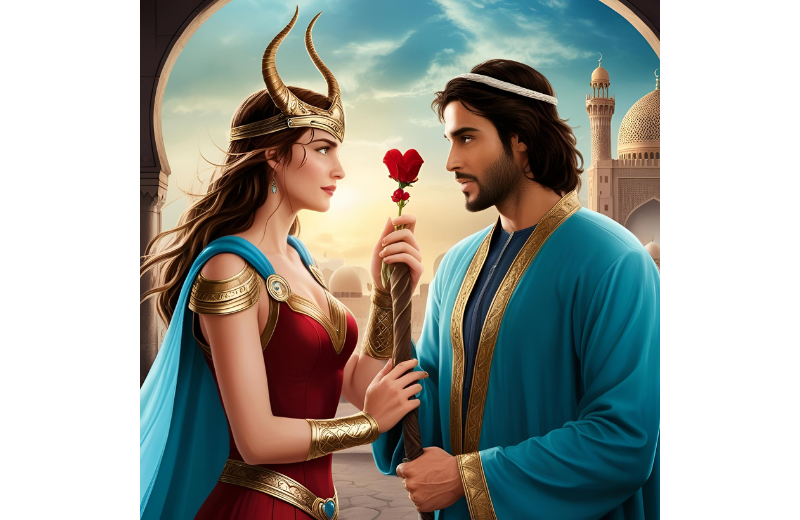
The tales of the Valkyries in Norse mythology explore themes of fate, love, loyalty, and divine punishment. These myths reveal the complexity of Valkyries, showing them as both fearsome warriors and figures capable of deep emotion.
Valkyries on the Battlefield
The Valkyrie mythology is filled with vivid imagery of these celestial shield-maidens appearing amidst the chaos of battle, clad in gleaming armour. They guided fallen warriors and actively shaped the outcome of conflicts, deciding who would fall and who would claim victory. They often rode winged horses or wolves as they carried out Odin’s will.
The Tragic Tale of Brynhildr
One of the most famous myths centres on Brynhildr, a Valkyrie who was punished by Odin for defying his command in choosing the wrong warrior to save. As a result, she was cast from her divine role and forced into a deep, enchanted sleep until awakened by a mortal hero. Her story weaves together themes of love, betrayal, and tragic destiny, showing how even a powerful Valkyrie could be subject to the harsh consequences of divine law.
Valkyries and Mortal Love
Many legends speak of Valkyries falling in love with mortal men—warriors they once guided or encountered on Earth. These romances were often bittersweet, as the Valkyries’ divine duties and immortal nature clashed with human lives. Such stories highlight the Norse belief in the inevitability of fate and the fleeting nature of joy, reminding listeners that even love could not escape the threads woven by destiny.
The Role of Valkyries in Norse Storytelling
In Norse Valkyrie mythology, these figures weren’t simply passive escorts to the afterlife. They embodied fate (or "wyrd") and were seen as extensions of Odin’s will. The Valkyrie represented honour, courage, and the harsh realities of war.
But are Valkyries Vikings? Not exactly. While they are closely associated with Viking culture and ideals, Valkyries were divine or semi-divine beings, not human warriors. That said, the image of the female Viking Valkyrie likely inspired tales of shield-maidens—real women who may have fought alongside Viking men.
What Powers Did the Valkyries Possess?
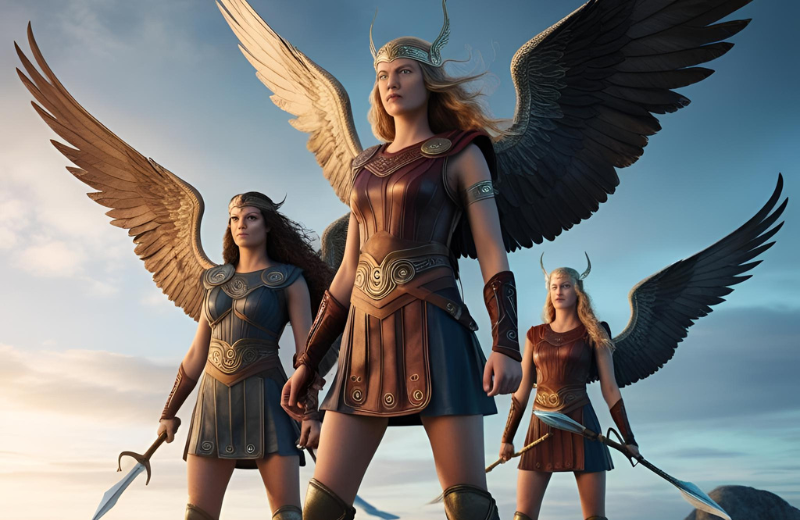
The Valkyries in Norse mythology wielded extraordinary powers granted by the gods. Let’s explore the key powers that made the Valkyrie such awe-inspiring figures in legend.
- Control Over Life and Death: Perhaps the most defining power of a Valkyrie was the ability to decide who would live and who would die in battle. Acting on Odin’s command, they guided the fates of warriors, selecting the bravest to ascend to Valhalla. This control over mortal destiny made them both worshipped and feared by Viking warriors, who believed their actions on the battlefield were watched closely by these divine shield-maidens.
- Supernatural Combat Skills: As warrior spirits, Valkyries possessed unmatched combat abilities. Clad in shining armour and armed with spears or swords, they could ride through battle untouched by mortal weapons. Though they rarely fought alongside humans, their presence alone could turn the tide of war. Their skill symbolised divine strength and the ideal of the fearless warrior.
- The Ability to Traverse Realms: Valkyries could move freely between the human world (Midgard) and the divine realms, particularly Asgard and Valhalla. This ability allowed them to escort fallen heroes across spiritual planes. Their connection to multiple realms also linked them to the cosmic forces of fate, making them key figures in maintaining the balance between Norse gods and mortals.
- Prophecy and Fate Weaving: Some myths suggest that Valkyries had prophetic insight, able to foresee the outcomes of battles and the fates of men. They were often associated with weaving the threads of destiny, much like the Norns, the Norse fates. This power tied them directly to the concept of "wyrd," the inescapable fate that governed all beings in Norse belief.
Symbols Associated with Valkyries
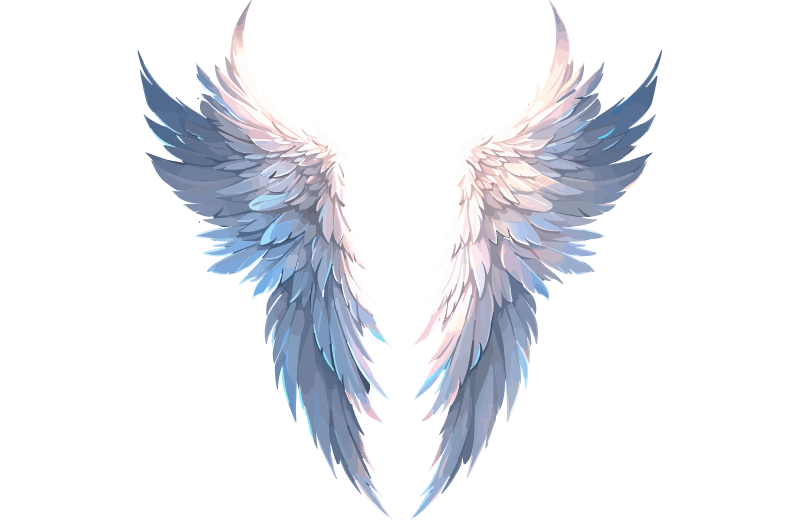
Valkyrie symbolism is deeply tied to themes of fate, war, and the afterlife. Common symbols include:
- Wings or winged helmets: Representing their ability to soar between realms.
- Spears and shields: Symbols of protection, battle, and divine authority.
- The Valknut: A symbol linked to Odin and the slain warriors they guided.
Valkyries’ Lineage and Connections
The origins of the Valkyries are deeply rooted in Norse mythology, where they serve as divine shield-maidens closely connected to Odin, the chief of the gods. While they are not considered deities themselves, their role places them among the most powerful and respected beings in the mythological hierarchy.
Some stories suggest that certain Valkyries were daughters of Odin, blending familial ties with divine duty. Others were seen simply as celestial beings chosen for their unwavering loyalty and strength. Myths often depict Valkyries working in groups, sometimes described as sisters, highlighting the sense of unity and shared purpose among them.
Why Are Valkyries Special?
Valkyries hold a special place in Norse mythology because they embody the core values of courage, honour, and the acceptance of fate. Their presence signified more than just the transition from life to death; it was a mark of distinction for warriors who had proven themselves worthy in battle. To be chosen by a Valkyrie was considered one of the greatest honours a Viking could achieve.
What makes the Valkyrie truly unique is the duality they represent. They are depicted as graceful and otherworldly, yet they command immense power and authority over life and death. This balance of beauty and strength captured the Norse view of existence, where glory and doom often walked hand in hand.
Valkyries in Modern Culture

The image of the Valkyrie has transcended ancient myth, becoming a lasting symbol in modern culture.
One of the most iconic representations is found in Wagner’s Ride of the Valkyries, a powerful piece of music that evokes the drama and grandeur associated with these legendary figures. In recent years, Valkyries have been reimagined in popular films such as Thor: Ragnarok.
Valkyries also appear frequently in video games, including God of War, where they are depicted as formidable beings guarding ancient secrets. Literature hasn’t been left behind either, with authors like Neil Gaiman weaving Valkyrie tales into modern retellings of Norse myths.
Today, Valkyries are often seen as symbols of empowerment—figures who embody resilience, autonomy, and the timeless allure of myth.
Valkyries’ Worship and Legacy
Although Valkyries were not worshipped like the gods of Asgard, they were deeply respected and honoured within Norse culture. Warriors viewed them as noble figures who could deliver them to eternal glory in Valhalla. Seeing a Valkyrie on the battlefield was considered a sign that a warrior’s deeds had earned the favour of Odin.
Their legacy is preserved through sagas, poetry, and folklore that continue to echo across Scandinavia and beyond. The image of the Valkyrie—armoured, fearless, and guiding the fallen—remains a powerful symbol of fate and heroism.
Recommended for you!
Best SellersFrequently Asked Questions About Valkyries
What does Valkyrie mean?
The Valkyrie meaning comes from the Old Norse word valkyrja, meaning "chooser of the slain." In Norse mythology, they selected brave warriors who died in battle and guided them to Valhalla. Their name reflects both their fearsome presence on the battlefield and their sacred duty in serving Odin.
Who cursed the Valkyries?
Some Valkyries, like Brynhildr, were cursed by Odin for disobedience, often forced to live as mortals or placed under enchantments. These tales highlight the tension between divine duty and personal choice. The curses served as reminders of Odin’s absolute authority.
Is a Valkyrie male or female?
Valkyries are traditionally female, depicted as powerful maidens who served Odin. There are no references to male Valkyries in Norse myths, as they embodied ideals of divine femininity and fate. Their role celebrated both strength and mysticism.
What is a Valkyrie in the Bible?
There is no mention of Valkyries in the Bible, as they are exclusive to Norse mythology. The Bible and Norse legends come from entirely different traditions with no shared mythological figures. Any link between the two is purely fictional.
Are Valkyries supposed to be beautiful?
Valkyries were described as stunningly beautiful, symbolising both divine grace and power. Their beauty represented more than appearance—it reflected their mystical nature. They could inspire awe as both gentle maidens and fierce warriors.
Can Valkyries have children?
Some myths suggest Valkyries who loved mortal men could have children, blending human and divine traits. These offspring were often seen as exceptional in strength or courage. Such unions, however, were rare and often led to complex fates.
Who is the strongest Valkyrie in Norse mythology?
While Brynhildr is one of the most famous, other Valkyries like Sigrún and Göndul were famed for their strength and wisdom. The myths don’t rank them explicitly, but each had unique qualities.
What are Valkyries' weaknesses?
Like many mythical beings, Valkyries could be bound by love or punished by the gods, as seen in Brynhildr's tale. Their vulnerability often lay in their connections to mortals or defiance of divine orders.
Was Freya a Valkyrie?
Freya, the goddess of love, beauty, and war, wasn’t a Valkyrie, but she did share a similar role. Freya chose half of the slain warriors to dwell in her hall, Fólkvangr, while Odin’s Valkyries took the other half to Valhalla.
Study Norse Mythology for £29
If Valkyries have sparked your curiosity about Norse legends and forest spirits, there’s so much more to explore. Norse mythology is full of fascinating figures—gods, giants, creatures, and powerful women—each with their own stories, lessons, and mysteries.
You can deepen your understanding with the Norse Mythology Diploma Course from Centre of Excellence. Whether you’re a complete beginner or already have some knowledge, you’ll find our online course both informative and inspiring.











